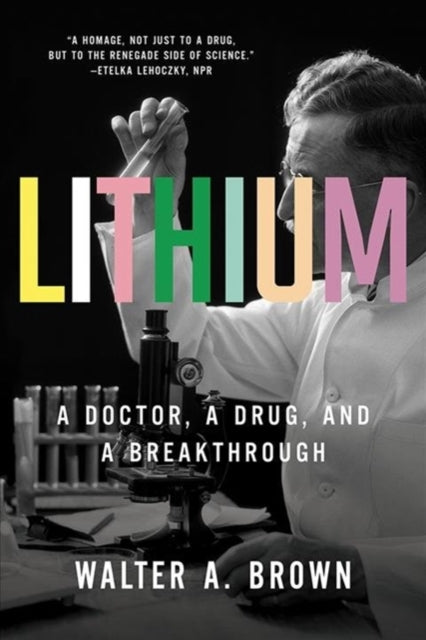Walter A.Brown
Lithium: A Doctor, a Drug, and a Breakthrough
Lithium: A Doctor, a Drug, and a Breakthrough
YOU SAVE £2.34
- Condition: Brand new
- UK Delivery times: Usually arrives within 2 - 3 working days
- UK Shipping: Fee starts at £2.39. Subject to product weight & dimension
Bulk ordering. Want 15 or more copies? Get a personalised quote and bigger discounts. Learn more about bulk orders.
Couldn't load pickup availability
- More about Lithium: A Doctor, a Drug, and a Breakthrough
Lithium was discovered in the 1950s to effectively end and prevent manic depressive episodes, saving countless lives. However, it took decades for the medical community to be convinced of its safety and life-saving benefits.
\n Format: Paperback / softback
\n Length: 272 pages
\n Publication date: 11 September 2020
\n Publisher: WW Norton & Co
\n
For centuries, individuals with bipolar disorder endured perilous and ineffective treatments, ranging from insulin comas and lobotomies to incarceration. The breakthrough in the 1950s, however, brought salvation, as John Cade discovered the remarkable efficacy of lithium in both ending and preventing manic depressive episodes. Cade's experience as a prisoner of war running a psychiatric ward sparked a hunch that led to his groundbreaking revelation.
Lithium, a miraculous metal, has since saved countless lives, demonstrating its immense healing power. Despite its undeniable success, it took decades for the medical community to fully embrace lithium as safe and life-saving. In his book, Walter A. Brown delves into the close call that nearly prevented the discovery of this extraordinary drug and showcases the boundless possibilities of scientific curiosity.
The journey to discover lithium began with Cade's observation that patients with bipolar disorder responded positively to the drug. He conducted experiments on himself and other patients, and his findings were published in 1949. However, the medical community was slow to recognize the significance of lithium's effects.
One of the challenges was the perception that lithium was a dangerous drug. In the 1950s, there was a widespread belief that it could cause toxicity and even death. This fear led to resistance from the medical community, who were hesitant to prescribe lithium to their patients.
Despite these obstacles, Cade persisted in advocating for lithium as a treatment for bipolar disorder. He conducted further research and collaborated with other scientists to demonstrate its safety and effectiveness. His work eventually caught the attention of the pharmaceutical industry, and lithium was introduced as a prescription drug in the 1960s.
The impact of lithium on the lives of individuals with bipolar disorder was profound. It provided relief from the symptoms of mania and depression, allowing patients to lead fulfilling lives. Lithium also reduced the frequency and severity of manic episodes, reducing the risk of hospitalization and suicide.
However, the road to acceptance was not without its challenges. The medical community was slow to recognize the benefits of lithium, and some patients experienced side effects such as weight gain and tremors. There were also concerns about the long-term effects of lithium on the body, such as kidney damage and lithium toxicity.
Despite these concerns, lithium remained the standard treatment for bipolar disorder for many years. It was only in the late 1990s and early 2000s that alternative treatments, such as mood stabilizers and antipsychotics, began to gain popularity. These treatments were often more effective than lithium and had fewer side effects, leading to a shift in the treatment landscape.
In conclusion, the discovery of lithium was a breakthrough that transformed the treatment of bipolar disorder. It offered hope and relief to individuals who had endured dangerous and ineffective treatments for centuries. John Cade's hunch and his relentless pursuit of scientific knowledge paved the way for this extraordinary drug, which has since saved countless lives.
While the medical community was slow to embrace lithium, it is important to recognize the contributions of individuals like Cade and other scientists who paved the way for scientific discovery. Their curiosity and determination have led to advancements in medicine that have improved the quality of life for millions of people worldwide.
As we continue to explore the complexities of mental health, it is essential to continue to invest in research and development of new treatments for bipolar disorder and other mental health conditions. By doing so, we can ensure that individuals with these conditions receive the care and support they need to live fulfilling lives.
\n Weight: 196g\n
Dimension: 140 x 209 x 16 (mm)\n
ISBN-13: 9781631497902\n \n
This item can be found in:
UK and International shipping information
UK and International shipping information
UK Delivery and returns information:
- Delivery within 2 - 3 days when ordering in the UK.
- Shipping fee for UK customers from £2.39. Fully tracked shipping service available.
- Returns policy: Return within 30 days of receipt for full refund.
International deliveries:
Shulph Ink now ships to Australia, Belgium, Canada, France, Germany, Ireland, Italy, India, Luxembourg Saudi Arabia, Singapore, Spain, Netherlands, New Zealand, United Arab Emirates, United States of America.
- Delivery times: within 5 - 10 days for international orders.
- Shipping fee: charges vary for overseas orders. Only tracked services are available for most international orders. Some countries have untracked shipping options.
- Customs charges: If ordering to addresses outside the United Kingdom, you may or may not incur additional customs and duties fees during local delivery.


